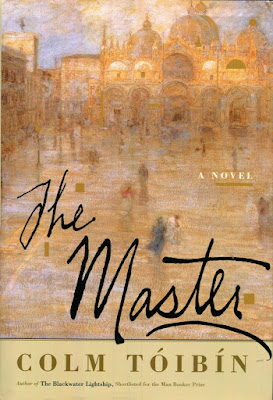 |
| New York : Scribner, 2004 |
Opening in January 1895 with the premier of Guy Domville, Henry James' first play, The Master proceeds through the final five years of the nineteenth century. James is 52 at the start of the novel and the events of the ensuing five years recall key moments in his life—particularly the deaths of his parents, his sister and his close friend, the novelist Constance Fenimore Woolson. These events highlight his struggle to maintain relationships throughout his life.
Writing short stories and novels, James has preferred to work in solitude, resulting in challenges in relationships with both family and friends. His primary relationship is to his work so he avoids the opening of his play by attending another theater performance, an Oscar Wilde play (likely An Ideal Husband). After Guy Domville closes as a failure the night that it opens, The Importance of Being Earnest opens in its place, giving Wilde two plays in production at the same time.
Within a few months, Wilde's star has fallen and two friends (Jonathan Sturgess and Edmond Gosse) begin sharing weekly updates with James regarding the ensuing trial for gross indecency. James' reaction makes it clear that he believes it's too dangerous to live honestly and the trial only confirms his commitment to his writing and avoidance of romantic attachments.
References to more accepting countries in Europe are used to highlight the danger of being gay in England at this time. Rumors of Wilde's fleeing to France before he was ultimately imprisoned made sense given the permissive laws there. After Wilde's imprisonment, James continued to converse with Edmond Gosse and the subject of expatriate John Addington Symonds entered the conversation. Symnonds had lived in Italy because of its more accepting culture and had privately published A Problem of Greek Ethics, a defense of homosexuality and sent copies to friends in England who were horrified. Although not expressly stated, there is an implication that James was one of the recipients.
 |
| Henry James and Hendrik Anderson c.1907 |
James walked a tightrope when it came to managing relationships in society. He needed the interaction, since that's where many of his storylines were borne, but how do you maintain relationships with men without inciting gossip, such as happened regarding his relationship to the young sculptor, Hendrik Christian Anderson, or with women without creating an expectation of something more. As Baroness von Rabe notes late in the novel,
“I remember you when you were young and all the ladies followed you, nay fought with each other to go riding with you. That Mrs. Sumner and young Miss Boott and young Miss Lowe. All the young ladies, and others not so young. We all liked you, and I suppose you liked us as well, but were too busy gathering material to like anyone too much. You were charming, of course, but you were like a young banker collecting our savings. Or a priest listening to our sins.” (p.265)In order to survive, James had to keep his interior feelings quite separate from his outward interactions. When he occasionally softens that division, society provides a warning encouraging that wall to remain in place. When he's asked by his niece why Isabel returns to Osmond at the end of Portrait of a Lady, he says "It is easier to renounce bravery rather than to be brave over and over.” (p.325)
No comments:
Post a Comment